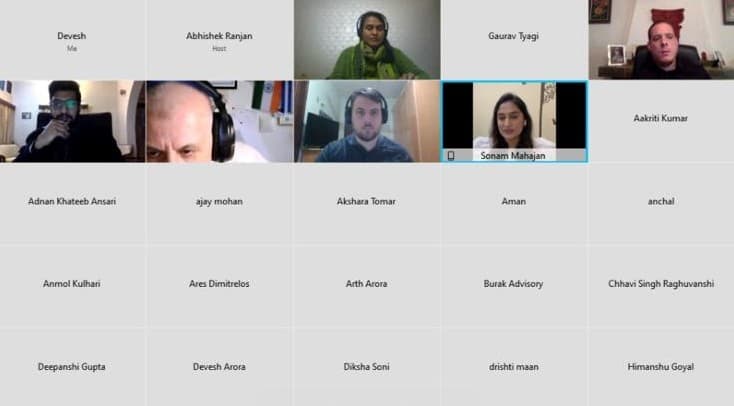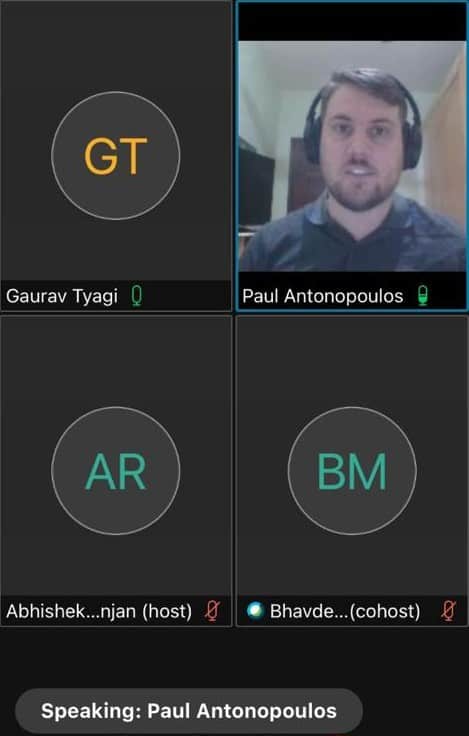At a time when Turkey and Pakistan are increasing cooperation to target both Greece and India, Dr. Abhishek Ranjan and Bhavdeep Modi of New Delhi-based Red Lantern Analytica think-tank organised a crucial webinar to discuss strategies on countering this common threat.
The Indo-Greece Cooperation: Countering Turkey-Pakistan Nexus webinar, moderated by Dr. Gaurav Tyagi from the Jawaharlal Nehru University, featured Dr. Vandana Mishra from Jawaharlal Nehru University; independent geopolitical analyst Sonam Mahajan; Director at the Research Institute for European and American Studies, Dr. John Nomikos; MEP of the Greek Solution, Emmanouil Fragkos; and, Andreas Mountzouroulias from Penta Postagma.

Various strategies in countering the common Turkish-Pakistani threats were discussed, as well as how to boost Greek-Indian relations.
Among the most impressive ideas raised was for Greece to launch its first military satellites with Indian cooperation and knowhow.
However, many productive ideas were suggested and can be heard in the recording of the webinar.
Greek City Times' Paul Antonopoulos participated in the webinar, giving a Vote of Thanks and Final Statement to the webinar, where it was emphasised that Greco-Indian relations stretch back 2,300 years back to the time of Alexander the Great.

The Final Statement, as well as the entire webinar recording, can be seen below.
https://youtu.be/BRbtNj1xe5g?t=4980
The full Vote of Thanks and Final Statement can be read here:
Ladies and Gentlemen, it gives me immense pleasure to deliver the Vote of Thanks for this highly engaging and highly critical webinar. Alexander the Great first arrived in the Indus Valley 2,300 years ago as a conqueror but left as a dear friend of King Porus. Nearly a thousand years before the concept of an England was conceptualised and nearly 2,000 years before the founding of the United States of America, Greeks and Indians had already gone to war, and then immediately become friends.
Although Greek philosopher Pythagoras is credited for the Pythagorean theory, Indians had known of this theorem at least 300 years earlier via the Shuba Sutra of Baudhayan. It is perhaps here that further defines the immensity of our civilizations - both capable of independently discovering, researching, philosophizing and theorizing revolutionary ideas and thoughts that are for the betterment of humanity. Our civilizations survived the test of times when others went into the pages of history permanently, such as the Babylonians.
I am sure that Alexander the Great and King Porus would be proud of the fact that the friendship between the Greek and Indian peoples, that they themselves built and established, is being continued 2,300 years later, and this webinar is a testament to that.
Unfortunately, instead of discussing ways to achieve prosperity for our countries through the exchange of capital, technology and education, we must prioritize our bilateral relations in the security field due to our respective countries bordering revisionist countries Turkey and Pakistan.
I would like to thank Andreas Mountzouroulias who was not only the first to open the discussion among our six highly distinguished speakers, but also highlighted the fact that Erdogan has neo-Ottoman dreams and that Greece needs a new dogma to counter Turkish aggression.
A special vote of thanks must also be extended to Dr. Vandana Mishra, whose short presentation today demonstrated to us why she is one of the top international relation professors in India. The professor explained to us how Erdogan is attempting to portray himself as the defender of Islam in this context, alongside Pakistan and Iran, and how this pose as a common threat to all our countries, especially in Kashmir. She also emphasized the importance that India and Greece continue building military ties, and how France should enter in a trilateral format. More importantly, she highlighted the absolute necessity that cultural ties between India and Greece must be strengthened.
I extend a very hearty vote of thanks to Emmanouil Fragkos, whose position in the European Parliament provided us all with a very unique perspective on how the hostilities against Greece and India by Turkey and Pakistan and their efforts on nuclear power. Unfortunately, he could not join us but left us an insightful video message.
Dr. John Nomikos has once again shown us why he is one of Greece's top security analysts and we thank him for his time in appearing in today’s webinar. His highlighting that Turkish-Pakistani aggression has helped consolidate Greek and Indian relations as they are a national security threat was very insightful. He also suggested ways in which Greek and Indian relations can be improved through joint initiatives in the military sector and multilateral formats.
I give my vote of thanks to Sonam Mahajan. We could not have asked for a more concise and detailed final speaker and she certainly raised thought provoking ideas. Ms Mahajan highlighted that Turkey and Pakistan want to infiltrate our respective countries, and that unfortunately the EU has not done enough to support Greece against Turkish aggression in the East Mediterranean. She also highlighted that Turkey does not want to end its aggression, partially because of its declining economy.
As a final statement, we have a 2,300-year-old legacy that we must build, in respect of our civilizations and ancestors, and their achievements. We should not only pat ourselves on the back and say today’s seminar was good and what an excellent job we did, but we must use this opportunity to further build cross Greek-Indian relations through academic, journalistic, economic, military, technological and political exchanges.
Another important factor is that we no longer face a common threat from only joint Turkish-Pakistani aggression. We must remember that only last week Pakistan, Turkey and Azerbaijan issued a joint statement claiming they will all collectively support each other’s regional issues – this means Pakistan against Kashmir, Turkey in Cyprus and the East Mediterranean, and Azerbaijan against the Armenians. Although we have done an excellent job in advancing bilateral relations between Greece and India today, the collective threat is much wider and in future exchanges we must also include our friends from Cyprus and Armenia.
Greece faces a Turkey that is bringing neo-Ottoman ambitions from the realm of theory to reality as its recent wars against Syria, Libya and the Armenians of Nagorno-Karabakh demonstrate.
Meanwhile, Pakistan and its expansionist ambitions to conquer Jammu and Kashmir, adopts the ideology of Neo-Mughalism, believing that they are the successors of Turkic conquerors rather than Islamified Indians.
It is of little wonder that both Pakistan and Turkey now have strong ties, and not based on economic cooperation and development to alleviate their permeating issues of poverty and economic crises, but to continue their goal of territorial expansionism at the expense of the indigenous peoples of Greece and India.
But they will not succeed.
I thank you all and wait with excitedness and anticipation to see what we can all do collectively to continue building Greek-Indian relations even deeper.
Bharat Mata Ki Jai
Zito H Hellas

